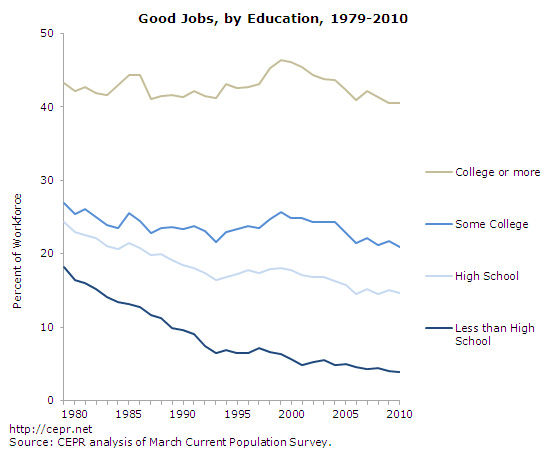CEPR is out with a new report about good jobs in the modern economy. In the report, CEPR defines a good job as one that pays $18.50/hr (the inflation adjusted male median wage of 1979), has employer-provided health insurance, and has an employer-sponsored retirement plan. In total, 24.6 percent of the population had good jobs in 2010, which is down from 27.4 percent in 1979. This simple comparison understates the decline of good jobs however as it leaves out the dramatic increase in educational attainment since 2010, as well as the shifting age dynamics.
When controlling for age and education, the decline becomes more apparent. The percentage of people in good jobs has declined for every single age group and every single level of educational attainment. Here is the trend just for educational attainment:

A few things to note. First, overall economic productivity per capita has substantially increased since 1979. That is, we have more stuff now than we did then, meaning there is no reason why the same level of security and compensation achieved by workers in 1979 should be unattainable at present. If anything, we should be majorly outpacing the 1979 compensation norms, not falling behind them. The problem of course is that the structure of the economy has changed, and that has changed the types of jobs that exist.
Sophisticated thinkers realize that this should never be a problem for actual compensation. If the structure of the economy changes in a way that increases overall productivity even by gutting out good jobs, tax and transfer programs can more than compensate, and everyone should be better off. However, the US has low tax and transfer rates relative to other countries.
Second, ideology will make it very difficult to compensate for the pain caused by structural shifts that eliminate good jobs, while increasing overall productivity. Sure, it is trivial to comment that as a policy matter, everyone can always be improved by productivity increases — even those that eliminate good jobs — with the right policies. It is another to get over the ideological hurdle that makes people oppose those policies.
Even though I realize that any given economic structure — and the end compensation it delivers to individuals — is as arbitrary as the next, that is not how everyday people seem to think about it. They regard income paid at the job as your real income or deserved income. Income brought in after the fact through transfers is not regarded that way, and likely wont be regarded that way anytime soon.
I recently had a discussion with an adamantly pro-union working class fellow about tax and transfer programs, just to see what he might think of them. Of course, he regarded them as handouts and not the right way to do things, and believed unions could raise the wages of working class people in a better way. I pushed him further, and he threw out this idea in lieu of transfer programs: have the government give tax breaks to employers that pay a living wage (or we could say employers that provide good jobs).
I explained that this is really no different than a transfer program. The government gives money to employers (against the no-tax-break baseline) who then give some of it to workers, which raises their wages. It goes through the employer, and so it does not quite look like a transfer; but, it’s effectively the same thing. He understood this, but insisted that it was a better way.
What you see then is a deep-seated ideology in favor of having that money come in the paycheck. Even if you can achieve the same outcomes through transfers, and more efficiently, many people just do not want it to go that way. Against this ideological and political backdrop, good jobs are the only way to improve people’s lives. Their decline then is a serious problem for a political culture that just cannot stomach other ways of fixing these problems.
Finally, it deserves pointing out that the percentage of good jobs declined for all education ranges. This supports a point I have made frequently: the whole idea that more and more education will somehow reduce poverty and inequality is misguided. In an advanced capitalist economy like ours, most people are involved in a basically zero-sum competition to capture jobs. The constitution of the overall pool of jobs that they are competing for largely dictates the amount of overall inequality and poverty. If structural shifts cause good jobs to decline even while educational attainment shoots up — which is our present reality — inequality and poverty will still grow. Education fetishists seem to have no real grasp of labor markets, and thus fail to appreciate this.